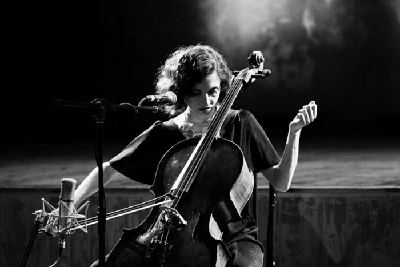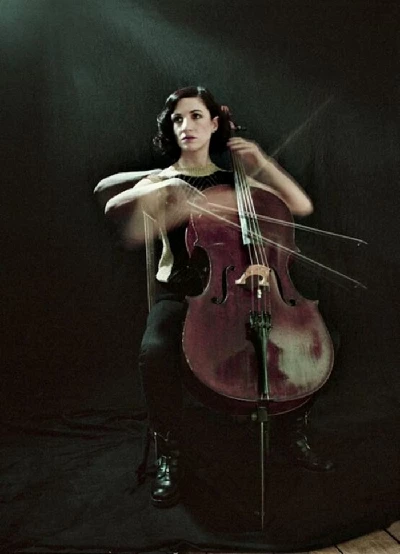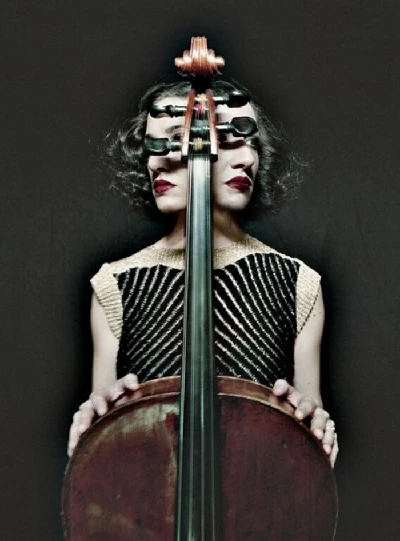Miscellaneous
-
Interview
published: 22 /
7 /
2015

Laura Moody talks to Owen Peters on her work ethic as a cellist, singer and lyricist, her new album 'Acrobats' and why she wants men to open up on mental health issues
Article
Laura Moody, with her red dress, red lipstick, black leggings, has the concentration of a matador. She has a stage presence, a confidence, an ownership of it even before a cello note is played.
Her audience at the Spitalfields Music Summer Festival is sparse. I don’t think she cares.
It isn’t long into her set before the audience realise they are witnessing an artist who is unique, different, challenging and above all extremely talented.
Moody doesn’t so much caress her cello, but she flays it with bow strokes, brimming with pace and passion. Whilst her bow rests, she plucks, taps, pats, strums, turning her cello into a physical space and becoming a one woman drum and bass beatbox.
Moody is performing tracks from her debut album ‘Acrobats’. She has developed a specific style, using her voice as a conduit for shrieks, yelps, and screams accompanied only by a cello. Like a magician’s trick she leaves you wondering, “How did she manage that?”
The performance is physical and raw, changing to passive and mellow. Cello and bow are stroked, caressed, wrestled, coming together, intertwining in appreciation of each other. Then turning away like lovers no longer in need of what they can be for each other. Lyrically the performance is just as demanding; she doesn’t hold back on those who have done her wrong.
In ‘Turn Away’ Moody not only expresses pain and angst like an open wound, but she creates a choking, claustrophobic atmosphere. When screaming “I will never lay my head on you again/I do not love you”, her conviction is conveyed with the intensity of an operatic aria.
With ‘Memento’ the scene is set up when she tells the audience, “Searching can be more important than finding it.” Whispering the opening lines whilst she bows in a metronome style, she evokes a sense of meandering and wandering. Maybe it’s a lost love she’s found and lost: “You’re a ghost to me, but so close to me.”
There has been a communication failure by the organisers. Many of the attendees are not aware Moody is playing. Along with the audience she can hear revellers in the bar area. She decides to yodel her presence, “You can come in. Seats are available.” It is not very effective, but it is very amusing.
When we meet to discuss the album and her plans and future projects on a hot sunny day in London, I’m greeted by a far less intense Laura Moody.
Moody’s parents were delighted young Laura found the cello. “Up to being eight years old I was at best a bundle of energy, at worst a disruptive influence. My concentration levels were poor. Development at school was a concern. At this point there was a concern a medical condition of some kind may have been responsible for my inability to settle," she explains. “I went to cello lessons and everything changed, literally from the first time I touched a cello. It felt right.” By use of an imaginary cello she demonstrates, “I could work out where my fingers (left hand) should sit. The movement of the bow (right hand) instinctively felt right. My concentration improved and subsequent school results followed. My teachers believed I had a natural instinct for music which resulted in lots of encouragement, and so I took lessons working really hard to improve. I wasn’t a child prodigy, but I was quite good,” she states with a decent dollop of modesty.
The University of York became her base to study for a music degree. It’s where as she describes, “I really got into avant garde, contemporary music. The university had so many different classes. It opened my view on what could be achieved in music.” From York she went on to study for three years, gaining a postgraduate degree at Trinity College of Music.
Instead of taking the classical route, playing standard classic fare, Moody wanted to explore what was becoming a vision of “my music.” “There’s this amazing tradition and expertise in classical music but it can be hard as a young performer to feel real ownership over it. Too often to play say a Mozart piece is simply an exercise in trying to replicate someone else's work to a set standard. I knew that wasn’t the route I wanted to follow.”
Watching Moody play live throws up many questions. The one I have begging an answer is this: “In order to play at the standard that audiences witness, how good are you?” I ask rather pointedly. “Oh that’s a hard one,” she laughs, partly in surprise at the question, partly as a delaying tactic. “I think I’m quite good, but can get better. In fact I’m the best I’ve ever been. It’s easy to flatline after college as you can lose the discipline.”
As with other notable musicians or sportsmen I’ve interviewed, she shares her magic recipe for success and improvement as being down to hard work. “During those early years I worked extremely hard to improve my standard. These days, I play or rehearse most days. It’s never a chore to play the cello. Some would say those practise techniques are boring and repetitive, I find them rewarding. There are elements to my style which I’m told are very different from other cellists. But that question you’ve asked, how good are you, is something every musician wrestles with from time to time. It surprises me sometimes when people say (about themselves), ‘Oh, I’m quite musical but playing an instrument never quite worked out for me’. I want to say, “Well, how much time and effort did you actually put into it?” There isn’t a magic formula, other than working with your instrument every day. It’s not very romantic, I’m afraid.”
When we talk about the start of her solo career she explains it was something which came about over a period of time, rather than a planned decision. “There’s no doubt when I saw the Brodsky Quartet and Kronos Quartet I really wanted to be in a string quartet and perform new, pioneering music. Although I did sing through my teenage years, singing wasn’t something I had pursued since my university days. Things changed in 2006. I bought a speech level singing course on the internet.” She looks at me as though I should be surprised. I’m beginning to learn very little should surprise me about this woman.
“It provided voice exercises which allows your natural voice to be heard. At the time I was I was still stuck with a young girls’ voice, basically still with the vocal range my previous training had developed.” Listening to Moody’s 2009’ EP’ versus 2015’s ‘Acrobats’, her change in range and tone is very distinctive. Gone is the rather reedy, choral structure, and it has been replaced by a much fuller, robust confident sound.
During 2007 she began experimenting with the concept of beat boxing having worked with Killa Kela, incorporating not only the vocal percussion generally associated with hip hop, but cello percussion as well.
Over what Moody deems as “a really long time” she built up the component parts of a kick drum and snare bass beat. In deciding to sing a melody inspired by Sly and the Family Stone over a beat based on Kelis’s ‘Milkshake’, she had one song ‘Oh Mother’ ready for an audience. The opportunity came along when her friend Kerry Andrew arranged a night of experimental music called Gobsmack at the late lamented Spitz club. Moody signed up for the open mic section and using industrial language explains that she was “scared”, but I’m sure you get my drift here.
An audience member wanted Moody to perform at a festival in Ireland. More gigs, more interest soon followed. Friends and fellow musicians agreed what they heard was very special. Some didn’t know she could sing. She was performing in a way very few artists were doing, or could do. She had found what the marketing fraternity would call her USP (Unique Selling Point), but maybe that should read her unique talent.
‘Acrobats’ is made up of seven songs, six of which were written by Moody. She describes songwriting as her excavation work. “I’m sometimes surprised at my writing, as though it’s come from another source. It’s a way of dealing with things, getting emotions out in the open.”
When Moody talks of her music via the cello, there is a flow, an openness she’s at ease with the subject material. Talking through her songwriting is much more difficult. Although she is, and has been over the years an acclaimed cellist, her lyrics haven’t been explored. There are enough pauses from my questions to know discussions on lyrics are new, the territory is uncharted.
Moody tells me most of the songs were written during 2009/10. It reflects the unexpected break-up of a relationship. “I tend to write songs and leave them until I’m ready to introduce an arrangement. Going back to say 2000 I had no intention of writing. My focus was on my cello playing and string quartet. But sometimes songs come to you though because there comes a need to work through events which you weren’t expecting,” she explains somewhat apprehensively.
So would she prefer it if people concentrated just on her music and left her lyrics to one side? “Oh no. Words are very important to me. It means a lot when people give me feedback on lyrics I’ve written, because I’ve worked so hard in pulling them together. Tom Waits along with Bjork are my all-time favourite songwriters. I read poetry a great deal, always have done since school. The likes of Elizabeth Jennings, E.E. Cummings, Rainer Maria Rilke, Louis MacNiece, I love their works. Perhaps some of the poets I’ve mentioned have more influence on my work than actual singer-songwriters. Strangely no one ever seems to talk about Bjork’s lyrics. I find them incredible”
When beginning to discuss primarily the lyrics to ‘Acrobats’, I asked how she would describe herself and whether it was a singer songwriter. The front end of the conversation was she didn’t have an answer. Having stirred some of the murky waters, there is now clarity.
“Got it!” she says with a genuine sense that the question has been buzzing around in her head. “My writing style is about discovery, trying to discover things which are under the surface.”
“I need to be in the right place, personally to write. Thankfully I’ve started writing material for the next album. As ‘Acrobats’ is about loss, regret and isolation, I wanted to explore other themes and emotions, then everything was turned upside down. I suffered the most traumatic loss I’ve ever had to deal with.”
The Elysian Quartet were formed in 1999. Although Moody dabbled, performed and toured with the likes of the Gogmagogs and Meredith Monk Ensemble, it was with the Elysian Quartet she developed and matured as a cellist and a person. Performing all over the world with group members Emma Smith, Jennymay Logan and Vincent Sipprell they became a support unit for each other. “We were a close as you can be to a four way marriage,” Moody says summing up the bond between them. On January 30th 2015 Vincent Sipprell took his own life.
A welcome cool breeze finds its way into the room. “I don’t want to talk about Vince’s death in too much detail as there is a danger he’s remembered for his illness and not for all the amazing things he did during his life. I do feel we are totally unequipped to deal with mental health issues. The thing that troubles me is how we deal with people reaching out for help. Specifically men under 45 find the stigma of mental health a difficult concept to deal with. One of my friends summed up the problem very well when he said that all the things you usually throw at a problem - kindness, time, money, cleverness - they don’t work. The person with the illness doesn’t believe they deserve help. It’s so difficult to get beyond that.”
We talk about the possibility of becoming involved with mental health campaigns. She says it’s too early, but probably at some stage as the subject is simply too important to stand back and do nothing.
“I’ve only realised recently songwriting is my way of working things out. There is a song going round my head which is about Vince’s death. I need to get it completed. I’m writing my second album but what that will cover who knows…”
There is plenty going on in the Moody travel log, be it solo gigs or joint ventures, Slovakia, France, possibly North America, then back to the UK . All are part of her 2015 plans. But for now excitement looms in the shape of Manchester. Actually it’s Bjork who’s in Manchester, with Moody performing as part of her role models’ band. “God, I’m excited to meet her. I hope I can keep it all together,” she gushes with unbridled enthusiasm.
‘Acrobats’ isn’t so much seven individual songs on a CD, or good old vinyl. It’s a total body of work which is unique and expressive in musical arrangement and lyrical construction.
The optimum listening experience is, however, to catch Laura Moody play live. She is a cellist whose unique style and repertoire, will surprise, enthral and entertain all in one package.
Picture Gallery:-

